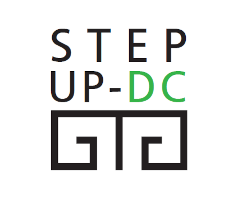Session 7, GEOGRAPHY - UON
STEPUP-DC Project

Course DescriptionBasic Topics
- The didactic goal of teaching Geography for EDC/HRE.
- Geography for EDC/HRE and Intercultural Education.
- Cultivating social justice through the teaching of Geography.
- Educational citizenship.
- Criteria for selecting texts for EDC/HRE.
- Designing the teaching intervention.
- Tools to be used in the teaching intervention.
Duration
The duration of the session is 9 hours (3 reading+3 learning+3 working/practicing)
Objectives
- To support students in developing a critical understanding of Geography.
- To support students in developing an understanding of Geography modules to promote EDC/HRE.
- To support students in recognising the characteristics of Geography to be used for EDC/HRE and Intercultural Education.
- To familiarise students with pertinent teaching strategies and practices to be used in order to promote EDC/HRE and Intercultural Education through Geography modules.
Learning outcomes
- Students will be able to critically analyse the meanings of Geography and their application in the teaching of Geography to promote EDC/HRE and intercultural education.
- Students will be able to describe the selection criteria for texts to be used in Geography modules to promote EDC/HRE and Intercultural Education.
- Students will be able to develop and implement effective teaching interventions, practices, and tools in the modules of Geography to promote EDC/HRE and Intercultural Education.
Outcomes and CDC
- Values
- Valuing cultural diversity
- No 2.9 Expresses the view that the cultural diversity within a society should be positively valued and appreciated.
- Valuing democracy, justice, fairness, equality and the rule of law
- No 3.12 Argues that schools should teach students about democracy and how to act as a democratic citizen.
- Attitudes
- Self-Efficacy
- No 8.44 Expresses a belief in his/her own ability to understand issues.
- Respect
- No 5.27 Gives space to others to express themselves.
- Tolerance of ambiguity
- No 9. 53 Deals with uncertainty in a positive and constructive manner
- Skills
- Autonomous Learning skills
- No 10.58 Shows ability to identify resources for learning (e.g. people, books, internet)
- Analytical and critical thinking skills
- No 11.68 Can identify any discrepancies or inconsistencies or divergences in materials being analysed.
- The didactic goal of teaching Geography for EDC/HRE.
- Geography for EDC/HRE and Intercultural Education.
- Cultivating social justice through the teaching of Geography.
- Educational citizenship.
- Criteria for selecting texts for EDC/HRE.
- Designing the teaching intervention.
- Tools to be used in the teaching intervention.
The duration of the session is 9 hours (3 reading+3 learning+3 working/practicing)
- To support students in developing a critical understanding of Geography.
- To support students in developing an understanding of Geography modules to promote EDC/HRE.
- To support students in recognising the characteristics of Geography to be used for EDC/HRE and Intercultural Education.
- To familiarise students with pertinent teaching strategies and practices to be used in order to promote EDC/HRE and Intercultural Education through Geography modules.
- Students will be able to critically analyse the meanings of Geography and their application in the teaching of Geography to promote EDC/HRE and intercultural education.
- Students will be able to describe the selection criteria for texts to be used in Geography modules to promote EDC/HRE and Intercultural Education.
- Students will be able to develop and implement effective teaching interventions, practices, and tools in the modules of Geography to promote EDC/HRE and Intercultural Education.
- Values
- Valuing cultural diversity
- No 2.9 Expresses the view that the cultural diversity within a society should be positively valued and appreciated.
- Valuing democracy, justice, fairness, equality and the rule of law
- No 3.12 Argues that schools should teach students about democracy and how to act as a democratic citizen.
- Valuing cultural diversity
- Attitudes
- Self-Efficacy
- No 8.44 Expresses a belief in his/her own ability to understand issues.
- Respect
- No 5.27 Gives space to others to express themselves.
- Tolerance of ambiguity
- No 9. 53 Deals with uncertainty in a positive and constructive manner
- Self-Efficacy
- Skills
- Autonomous Learning skills
- No 10.58 Shows ability to identify resources for learning (e.g. people, books, internet)
- Analytical and critical thinking skills
- No 11.68 Can identify any discrepancies or inconsistencies or divergences in materials being analysed.
- Autonomous Learning skills
A series of resources that the student teacher must study in this session and a series of additional resources for further study.
A full paper and additional e-lessons on the topics of the session and additional interactive presentation of the materials, for the student teachers to study all the materials in a row.
A series of authentic, up to date and relevant activities with their accompanying materials, which deliver the intended learning outcomes of the session and are carried out face to face or E-learning with groups of student teachers.
Several types of questions to evaluate how much the student teachers have learned throughout the session (reading material, learning material and workshop).
